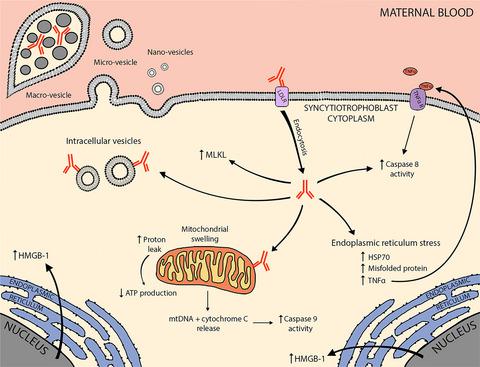当前位置:
X-MOL 学术
›
Am. J. Reprod. Immunol.
›
论文详情
Our official English website, www.x-mol.net, welcomes your feedback! (Note: you will need to create a separate account there.)
Antiphospholipid antibodies and extracellular vesicles in pregnancy
American Journal of Reproductive Immunology ( IF 3.6 ) Pub Date : 2020-07-26 , DOI: 10.1111/aji.13312 Mancy Tong 1 , Bridget W Tsai 2 , Lawrence W Chamley 2
American Journal of Reproductive Immunology ( IF 3.6 ) Pub Date : 2020-07-26 , DOI: 10.1111/aji.13312 Mancy Tong 1 , Bridget W Tsai 2 , Lawrence W Chamley 2
Affiliation

|
Antiphospholipid antibodies (aPL) are autoantibodies that target phospholipid‐binding proteins, such as β2 glycoprotein I (β2GPI), and can induce thrombosis systemically, as well as increase the risk of obstetric complications such as recurrent miscarriage and preeclampsia. Due to the expression of β2GPI by placental trophoblasts, aPL readily target the maternal‐fetal interface during pregnancy and many studies have investigated the deleterious effects of aPL on placental trophoblast function. This review will focus on studies that have examined the effects of aPL on the production and modification of extracellular vesicles (EVs) from trophoblasts, as EVs are a key mode of feto‐maternal communication in both normal and pathological pregnancy. A more comprehensive understanding of the effects of aPL on the quantity and cargo of EVs extruded by the human placenta may contribute to our current knowledge of how aPL induce both systemic and obstetric disease.
中文翻译:

妊娠期抗磷脂抗体和细胞外囊泡
抗磷脂抗体(aPL)是靶向磷脂结合蛋白(如β2糖蛋白I(β2GPI))的自身抗体,可全身性诱发血栓形成,并增加产科并发症(如反复流产和先兆子痫)的风险。由于胎盘滋养层细胞表达 β2GPI,aPL 在怀孕期间很容易靶向母胎界面,许多研究已经调查了 aPL 对胎盘滋养层细胞功能的有害影响。本综述将重点研究 aPL 对来自滋养层细胞的细胞外囊泡 (EVs) 的产生和修饰的影响,因为 EVs 是正常和病理妊娠中胎儿 - 母体交流的关键模式。
更新日期:2020-07-26
中文翻译:

妊娠期抗磷脂抗体和细胞外囊泡
抗磷脂抗体(aPL)是靶向磷脂结合蛋白(如β2糖蛋白I(β2GPI))的自身抗体,可全身性诱发血栓形成,并增加产科并发症(如反复流产和先兆子痫)的风险。由于胎盘滋养层细胞表达 β2GPI,aPL 在怀孕期间很容易靶向母胎界面,许多研究已经调查了 aPL 对胎盘滋养层细胞功能的有害影响。本综述将重点研究 aPL 对来自滋养层细胞的细胞外囊泡 (EVs) 的产生和修饰的影响,因为 EVs 是正常和病理妊娠中胎儿 - 母体交流的关键模式。



























 京公网安备 11010802027423号
京公网安备 11010802027423号